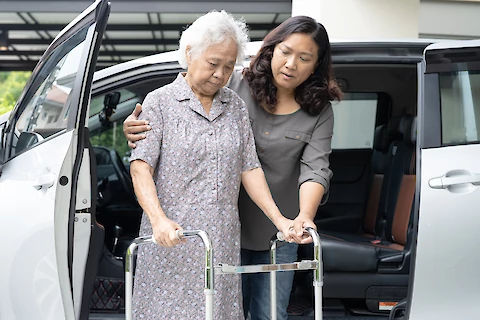
When it comes to the elderly, disability can have a particularly profound effect on their daily lives. Whether it's physical or mental limitations or financial concerns, the challenges older adults face can become even greater when they are disabled. Take a look at the common challenges faced by elderly individuals with disabilities and how family members can help make their lives easier.
Physical Challenges And Limitations
Physical disability affects approximately 10% of adults 65 years old and older. Common physical limitations for disabled elderly adults include vision impairment, hearing loss, mobility issues, and physical disabilities. With these physical limitations, the disabled senior may have difficulty with everyday activities such as housekeeping, cooking, shopping, and even bathing. Often, those physical limitations mean that they need extra assistance to take care of themselves at home.
Financial Challenges
Many disabled elderly adults face financial challenges due to their inability to work and earn an income. Adults who suffered from disability earlier in life may have left the workforce earlier than they thought, which means that they may not have adequate savings. Furthermore, they may have additional, unexpected costs related to dealing with those disabilities. This can often leave them feeling overwhelmed and helpless as they struggle to make ends meet and pay their bills. In some cases, they may be eligible for government benefits, such as Social Security Disability Insurance (SSDI), which can help offset some of these financial burdens.
Mental Health Issues
Many elderly adults will experience some level of mental health issues, especially if they suffer from high levels of isolation. For the disabled, these problems can become even more acute. Depression, anxiety, and cognitive decline can all impair the disabled senior's quality of life. In addition, elderly adults with disabilities are particularly vulnerable to abuse, either from other family members or from strangers. It is important for family members to look out for these warning signs and take steps to ensure that the elderly adult is safe.
Social Isolation
The elderly are particularly vulnerable to social isolation. Disabled elderly adults may have even greater problems getting out to interact with others. Mobility issues can make it harder for them to leave the house even for social activities. Furthermore, there is often a stigma attached to disability, which can discourage them from forming relationships with peers.
How Family Can Make Life Easier
There are many ways family members can make life easier for elderly disabled adults. Here are just a few:
- Provide Transportation: Arrange for transportation to doctor's appointments and other outings to help the senior remain active.
- Offer Help with Daily Tasks: Assist with housekeeping, cooking, shopping, and other activities of daily living to help maintain the senior's independence
- Assist with Medication Management: Help manage medications and refill prescriptions to ensure that the senior is taking all the proper medications in the proper doses
- Offer Emotional Support: Spend time with the senior to provide comfort and companionship.
- Look Into Local Resources: Research local resources such as senior centers, meal programs, and other assistance programs that can help ease the burden on seniors and their families.
Make sure that your offers of help are an ongoing conversation with your loved one since you do not want to impede their independence.
Do You Have A Loved One Who Needs Help At Home?
Disabled elderly adults living in Chicago, Lincolnwood, Niles, and Cook County face many challenges in their daily lives. While family can play an important role in making life easier, some cases may require professional help in order to ensure the senior's safety and quality of life. If you're looking for professional in-home care for a senior loved one, contact Senior Helpers Lincolnwood today and learn how we can help.